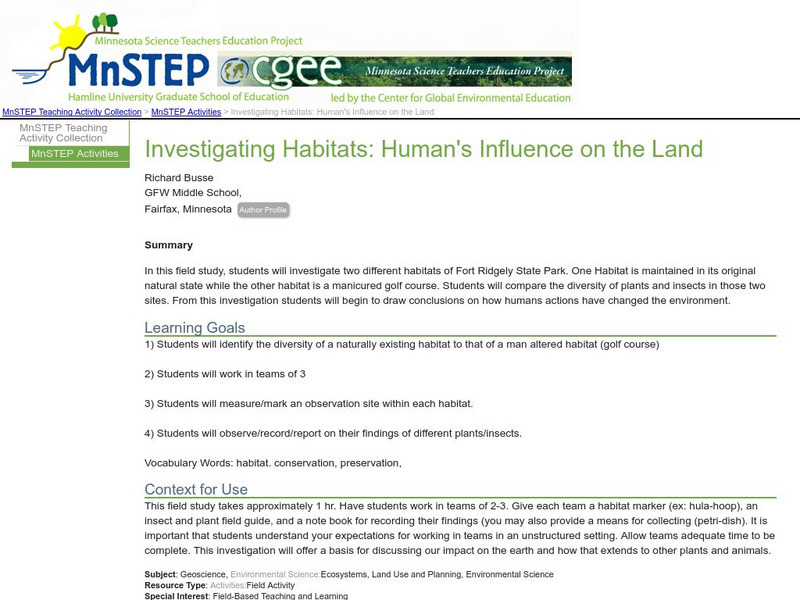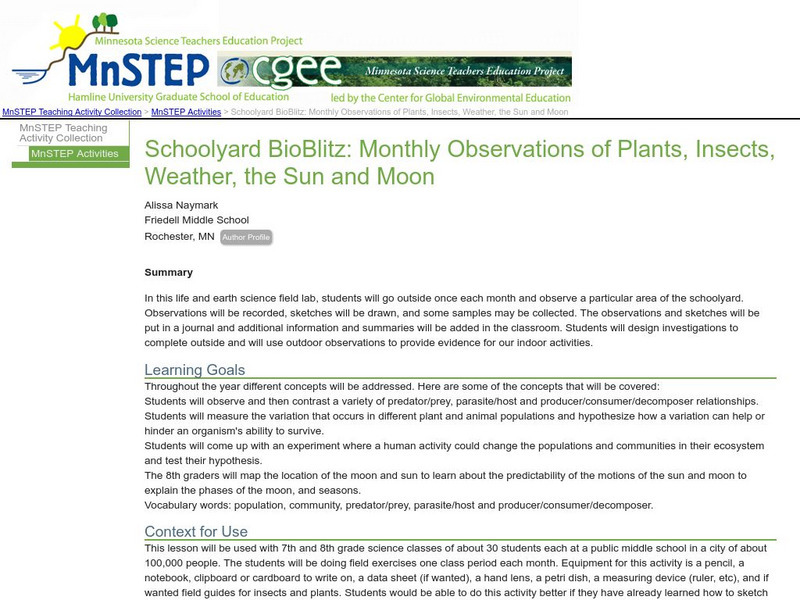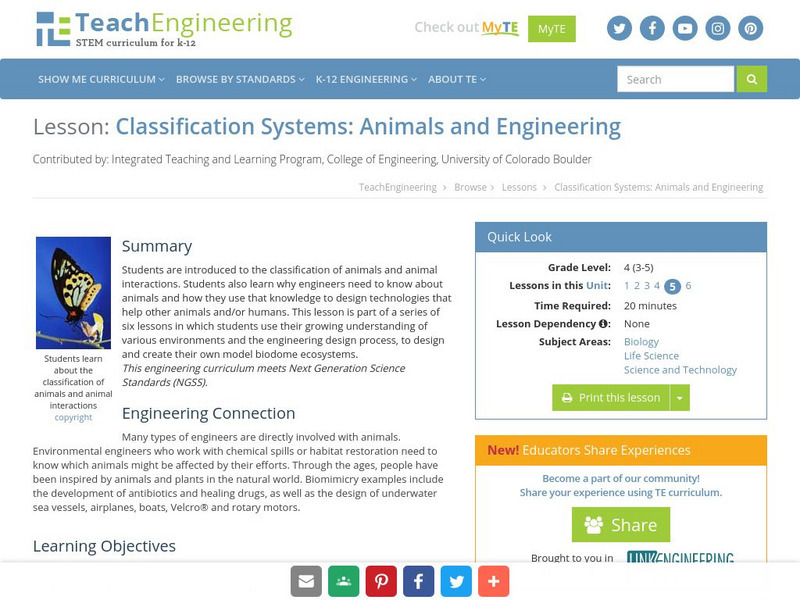Hi, what do you want to do?
Curated OER
The Importance of Water
Students explore the importance of water. They discuss why water is important and students design an experiment that evaluates the water quality and methods of improving water quality. Students perform testing and report their findings.
Curated OER
The Use of Biocards for Topical Review
Students create biocards to represent vocabulary from their biology course. They review and reinforce their basic knowledge of terminology, structures, or concepts. They create the cards to test themselves or classmates.
Curated OER
"Approaching Walden: From Emerson to Thoreau"
Learners examine selected local leaves in greater detail in the classroom by using more analytical drawing techniques. They use Thoreau's drawing of a Scarlett Oak as their model. Students choose a leave from a box of leaves removed...
Curated OER
How Do We Forecast Weather?
Third graders investigate how scientists collect weather data in order to forecast the weather. They work in small groups in order to research one type of weather technology such as, satellite images, radar, surface observations, or...
Curated OER
What is Migration
Students conduct individual research and participate in discussion be able to identify difference between forced and voluntary migration. They identify if push and pull factors are caused by political, social, economic, or environmental...
Curated OER
Student Peer Review Through a Discussion Board to Develop an Invasive Species Paper
Students develop electronic communication skills through a discussion board while peer reviewing a paper on invasive species. Students work in groups of three to provide constructive feedback on a classmate's paper.
Curated OER
Who Can Harvest A Walleye?
Seventh graders investigate the concept of how an ecosystem is put together while conducting research using a variety of resources. They correctly differentiate between a herbivore and carnivore by placing them in the order of hierarchy...
Curated OER
The Basics:Life Science
Students explore concepts in life science using segments drawn from Discovery Channel. In this life science lesson plan, students participate in discussions about the food chain. Students create a poster to illustrate a...
Curated OER
Seafood: For the Love of Fish
Students role play a scenario specific to decision making in seafood management and conservation. In this marine science lesson, students estimate seafood consumption in their state. They recommend new regulations for better fishery...
Curated OER
Welcome to Populations!
Students define what population is in their own words. For this biology lesson, students explain different ways to measure population density. They interpret population graphs.
Other
Alaska Sea Grant: Investigation 4 Human Impact Survey
Students examine and record data about the impact human activity has on a local aquatic environment in this teaching unit. They then analyze the information and develop a plan for improvement. The unit depends on being able to take the...
Science Education Resource Center at Carleton College
Serc: Ecology/geography Classification
This outdoor instructional activity helps students better understand ecological and geographical classifications by teaching it simultaneously in science and geography class. Presenting the two classifications together will help...
Science Education Resource Center at Carleton College
Serc: Investigating Habitats: Human's Influence on the Land
Students will investigate two different habitats; one habitat is maintained in its original natural state while the other habitat is a manicured golf course. Students will identify and compare the diversity of plants and insects in those...
Science Education Resource Center at Carleton College
Serc: Mn Step: What Killed Tweety? An Ecological Exploration of West Nile Virus
Students do research to learn about West Nile Virus, the birds that carry it, how it spreads, where it can be found in North America, and how it affects humans. The activity is set up as a WebQuest where students navigate to assigned...
BioEd Online
Bio Ed Online: Resources and the Environment: Humans Design Their Homes
After hearing and discussing the story of The Three Little Pigs, students work in groups to construct houses using craft sticks. They then decide how well their house would serve as a living space and in what climatic conditions it would...
BioEd Online
Bio Ed Online: How Much Water Do Humans Need?
In this lesson students learn how much water is used and lost during a variety of common daily activities. Student sheets are provided in English and in Spanish.
National Endowment for the Humanities
Neh: Edsit Ement: Folktales and Ecology: Animals & Humans in Cooperation,conflict
In this lesson plan, young scholars will consider Folktales and Ecology: Animals and Humans in Cooperation and Conflict. Worksheets and other supporting materials can be found under the Resources tab.
BioEd Online
Bio Ed Online: Resources and the Environment: Is It Natural or Transformed?
In this activity, learners learn about natural resources. They sort materials into two categories, whether it is natural or if it has been changed by humans.
Science Education Resource Center at Carleton College
Serc: Using Plant Surveys to Study Biodiversity
An extended field investigation intended as launch into several concepts in environmental science including biodiversity, human impacts on natural systems, and energy transfer in ecosystems.
Other
Ohio Dept. Of Education: Our Grasslands
This excellent unit of study for Grade Two has students examining what makes up a grasslands environment, growing their own grass, playing a predator-prey game, and looking at how grasslands are impacted by human activities.
National Geographic
National Geographic: Ecosystem Imbalance in the World
For this lesson, students build on their knowledge of individual impacts on the ocean to see how the whole system can react to threats and changes. They examine ways in which human actions throw marine ecosystems out of balance, explore...
Discovery Education
Discovery Education: Lesson Plans Library K 5
This resource presents a lesson plan library which holds hundreds of lesson plans organized by grade level and subject area. Often rooted with an Internet research piece, each lesson plan contains specific objectives, procedures,...
Science Education Resource Center at Carleton College
Serc: Mn Step: Schoolyard Bio Blitz
For this activity, students visit a small section of the schoolyard and record observations in a scientific journal. They will observe different things as the school year progresses, including ecological relationships, human impact on...
TeachEngineering
Teach Engineering: Animals and Engineering
Students are introduced to the classification of animals and animal interactions. Students also learn why engineers need to know about animals and how they use that knowledge to design technologies that help other animals and/or humans....




























